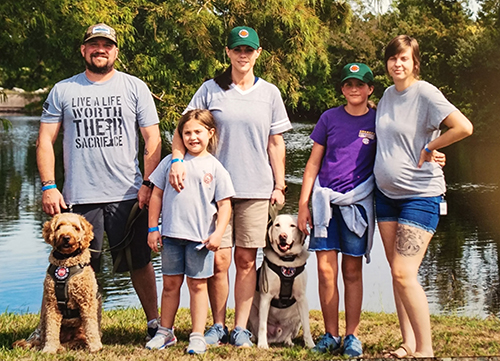
Adult Day Services: A Model of Person- and Family-Centered Care
by Lynn Friss Feinberg, MSW
 A recent study found that more than a quarter million participants attend an estimated 4,800 community-based adult day service (ADS) centers in the U.S. Although most participants are older people, more than one-third of ADS participants are younger than 65. Nearly one in three ADS participants has Alzheimer’s disease or another form of dementia.
A recent study found that more than a quarter million participants attend an estimated 4,800 community-based adult day service (ADS) centers in the U.S. Although most participants are older people, more than one-third of ADS participants are younger than 65. Nearly one in three ADS participants has Alzheimer’s disease or another form of dementia.
ADS centers provide coordinated and reliable services and supports. Services for participants include social activities, meals, personal care (such as help with toileting), a limited array of health services (such as medication management) and supervision during the day.
ADS are a good example of person- and family-centered care: Their mission is to provide supportive services for the "unit of care"—comprising adults with functional limitations and their family caregivers.
Do adult day services provide respite care?
ADS often are considered respite care: a way to give family caregivers time away from the daily stress of caregiving. Many family caregivers identify respite as one of their most pressing needs. By helping to prevent caregiver burnout, respite services can delay or prevent nursing home placement.
ADS centers also typically provide services to family caregivers themselves. These services can include educational programs, caregiver support groups and individual counseling. Some adult day programs offer services in the evenings and on weekends.
Most family caregivers hold down jobs. ADS enables working family caregivers to remain in the labor force, which helps them, and their families, remain financially secure. Most ADS centers also provide daily transportation to and from the center for participants, a big help for family caregivers who are usually pressed for time.
How can adult day services help people who care for family members with dementia?
Family caregiving can be especially overwhelming and stressful when caring for someone with dementia. Changes in memory, personality and behavior (such as wandering or asking questions repeatedly) can be challenging for family caregivers. Research has shown that the stress of family caregiving for people with dementia is associated with high emotional strain, poor physical health outcomes and increased mortality.
Groundbreaking new research by Steven Zarit and colleagues shows that ADS services are a promising intervention for improving long-term health and well-being of family members caring for someone with dementia. ADS helped these caregivers provide care longer while reducing their risk of mental health problems (such as depression) and physical health problems, too. Broadening the focus of caregiver interventions beyond emotional well-being, to include their impact on biological risk factors associated with chronic stress and disease, is an important next step in caregiving research to improve policy and practice.
Increasingly, consumers are rejecting nursing homes in favor of home- and community-based services. ADS can help build a better person- and family-centered system of long-term services and supports in the community.








 “Streaming is both accessible and not accessible,” Evans said. “The streaming part itself is accessible, in that it allows me to make my own schedule, and I can work it around my disabilities. However, the inaccessible part is the demand for content creators to constantly be networking, attending events and continuously pushing out content. I cannot attend events, and if I can they’re incredible stressful, so all my work networking has basically been done online, which thankfully is becoming a more acceptable side of content creation.”
“Streaming is both accessible and not accessible,” Evans said. “The streaming part itself is accessible, in that it allows me to make my own schedule, and I can work it around my disabilities. However, the inaccessible part is the demand for content creators to constantly be networking, attending events and continuously pushing out content. I cannot attend events, and if I can they’re incredible stressful, so all my work networking has basically been done online, which thankfully is becoming a more acceptable side of content creation.” “I must say over the years it has become less and less accessible for me,” Martínez said. “SMA (Spinal Muscular Atrophy) causes strength, endurance and mobility loss as time passes. I can’t use a physical keyboard as I used to, so it’s been years now with an on-screen keyboard. Voice dictation doesn’t work well for me due to my voice being inconsistent, not to mention my accent. In English it can go from totally wrong to acceptable. In Spanish, my native language, it works better.”
“I must say over the years it has become less and less accessible for me,” Martínez said. “SMA (Spinal Muscular Atrophy) causes strength, endurance and mobility loss as time passes. I can’t use a physical keyboard as I used to, so it’s been years now with an on-screen keyboard. Voice dictation doesn’t work well for me due to my voice being inconsistent, not to mention my accent. In English it can go from totally wrong to acceptable. In Spanish, my native language, it works better.” “What drew me to consulting was the opportunity to leverage my unique perspective as both an able-bodied and disabled gamer to improve the gaming experience for others,” Lane said. “I can share the frustrations I’ve faced as a disabled gamer and use that knowledge to advocate for better accessibility features. Companies and studios that I work with go the extra mile to make sure I have everything I need to succeed.”
“What drew me to consulting was the opportunity to leverage my unique perspective as both an able-bodied and disabled gamer to improve the gaming experience for others,” Lane said. “I can share the frustrations I’ve faced as a disabled gamer and use that knowledge to advocate for better accessibility features. Companies and studios that I work with go the extra mile to make sure I have everything I need to succeed.”



Connect with us on social media